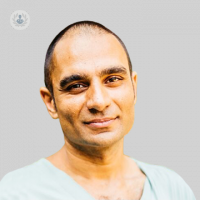Managing the stress - tinnitus/tinnitus - stress cycle
Written by:Did you know that stress can trigger tinnitus long after hearing damage may have occurred? And then, of course, tinnitus can lead to stress, and a frustrating cyclical issue can arise.
We speak to leading ENT specialist Professor Mahmood Bhutta about what happens if you're in the tinnitus - stress/stress - tinnitus cycle, and what's involved in managing what can be a deeply impacting condition.

What are the symptoms of tinnitus?
Tinnitus means a noise in the ear and typically, people describe a ringing noise in the ear that's typically high pitched, but actually it's quite variable. Some people describe a machinery-type noise, some people describe a noise that's pulsing. Sometimes it can be in one ear and sometimes in both ears.
What is the main cause of tinnitus?
Tinnitus can be caused by any disorder of the ear. Typically, it's caused by age-related hearing loss but it can also be caused by noise-induced damage, for example from prolonged exposure to very loud noise, either in an industrial setting or sometimes repeatedly going to entertainment venues.
Can tinnitus be treated?
Tinnitus can certainly be treated or perhaps it's better to say, managed. We know that tinnitus can be very distressing for patients, and so the management isn't just about trying to get rid of what started it off, but managing how people react to it.
We recognise a cycle whereby the noise can feel threatening and a result of that, people will understandably get very stressed by it. But that stress can contribute to the issue, in that all the senses are heightened so we end up with this cycle of stress and tinnitus; the tinnitus getting louder, causing more stress, and so on and so forth.
So what can be done? It depends a little bit on our findings. Sometimes there's hearing loss and what that means that sometimes the ear is over sensitive because it can't hear anything and we can bring in some sound, such as using a hearing aid, if there's hearing loss, to distract the ear and give it something to actually listen to.
Sometimes people find things such as sound therapy - listening to certain sounds - can help, and also distract the ear. Sometimes the tinnitus is a single frequency and there can be things like notch therapy where you play a sound but actually take the particular frequency that the patient is hearing from that soundscape. That means when they listen to that sound, their tinnitus actually becomes part of the sound they're listening to, which can also lead to reducing the stress associated with those symptoms.
On top of that, we do try to manage the stress that comes from this so we use cognitive behavioural techniques which are psychological techniques to make managing the condition much easier. We know that if the stress from the condition is reduced and the noise will also be reduced. Many patients will find that is helpful and they learn to live with these symptoms.
Does tinnitus worsen with age?
One of the leading causes of tinnitus is age-related hearing loss, and it's true that as age-related hearing loss gets worse the chance of tinnitus developing gets worse. Does tinnitus get worse with age? It may well do, but actually if we know that if we treat it early, or manage it early, the chance of that happening is much reduced.
What we also know, is that people who've been exposed to noise in the past, often don't realise the damage that's been done to their ears when they're young and we only see that developing at a later age.
When should I see a doctor about tinnitus?
There are certain types of tinnitus that should definitely warrant seeing a doctor about it; that is, if it's just in one ear, because very rarely it can be due to something else that's causing it, such as a little growth on the nerve of hearing. That isn't a cancer and usually it just needs monitoring, but it's something we normally recommend you definitely see something about if it's definitely just in one ear.
The other thing would be if it's pulsatile in nature, so if it sounds like your pulse. Because very rarely there can be some abnormalities in the blood vessels around the head and neck that are causing that problem. Again, that's not necessarily something to worry about, but it's useful to know that's what's causing it because sometimes there are treatment options for it.
The other reason to see a health professional, whether that's a doctor or someone who specialises in hearing therapy, would be up to you, but that would be if the tinnitus is getting to you and you're very stressed by it. Certainly talking to somebody about it and understanding what treatment options are available, can be very helpful. Because we know that, in severe cases tinnitus can have real effects on people's mental health including association with anxiety and symptoms of depression.
If you'd like to arrange an appointment with Professor Mahmoudi, you can do so via his Top Doctors profile.


